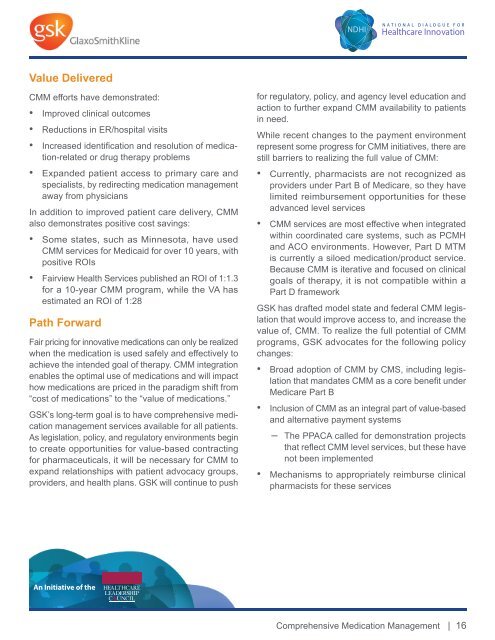VIable
HLCCompendium
HLCCompendium
Create successful ePaper yourself
Turn your PDF publications into a flip-book with our unique Google optimized e-Paper software.
NDHI<br />
NAT IONAL DIALOGUE FOR<br />
Healthcare Innovation<br />
Value Delivered<br />
CMM efforts have demonstrated:<br />
• Improved clinical outcomes<br />
• Reductions in ER/hospital visits<br />
• Increased identification and resolution of medication-related<br />
or drug therapy problems<br />
• Expanded patient access to primary care and<br />
specialists, by redirecting medication management<br />
away from physicians<br />
In addition to improved patient care delivery, CMM<br />
also demonstrates positive cost savings:<br />
• Some states, such as Minnesota, have used<br />
CMM services for Medicaid for over 10 years, with<br />
positive ROIs<br />
• Fairview Health Services published an ROI of 1:1.3<br />
for a 10-year CMM program, while the VA has<br />
estimated an ROI of 1:28<br />
Path Forward<br />
Fair pricing for innovative medications can only be realized<br />
when the medication is used safely and effectively to<br />
achieve the intended goal of therapy. CMM integration<br />
enables the optimal use of medications and will impact<br />
how medications are priced in the paradigm shift from<br />
“cost of medications” to the “value of medications.”<br />
GSK’s long-term goal is to have comprehensive medication<br />
management services available for all patients.<br />
As legislation, policy, and regulatory environments begin<br />
to create opportunities for value-based contracting<br />
for pharmaceuticals, it will be necessary for CMM to<br />
expand relationships with patient advocacy groups,<br />
providers, and health plans. GSK will continue to push<br />
for regulatory, policy, and agency level education and<br />
action to further expand CMM availability to patients<br />
in need.<br />
While recent changes to the payment environment<br />
represent some progress for CMM initiatives, there are<br />
still barriers to realizing the full value of CMM:<br />
• Currently, pharmacists are not recognized as<br />
providers under Part B of Medicare, so they have<br />
limited reimbursement opportunities for these<br />
advanced level services<br />
• CMM services are most effective when integrated<br />
within coordinated care systems, such as PCMH<br />
and ACO environments. However, Part D MTM<br />
is currently a siloed medication/product service.<br />
Because CMM is iterative and focused on clinical<br />
goals of therapy, it is not compatible within a<br />
Part D framework<br />
GSK has drafted model state and federal CMM legislation<br />
that would improve access to, and increase the<br />
value of, CMM. To realize the full potential of CMM<br />
programs, GSK advocates for the following policy<br />
changes:<br />
• Broad adoption of CMM by CMS, including legislation<br />
that mandates CMM as a core benefit under<br />
Medicare Part B<br />
• Inclusion of CMM as an integral part of value-based<br />
and alternative payment systems<br />
––<br />
The PPACA called for demonstration projects<br />
that reflect CMM level services, but these have<br />
not been implemented<br />
• Mechanisms to appropriately reimburse clinical<br />
pharmacists for these services<br />
Comprehensive Medication Management<br />
| 16


